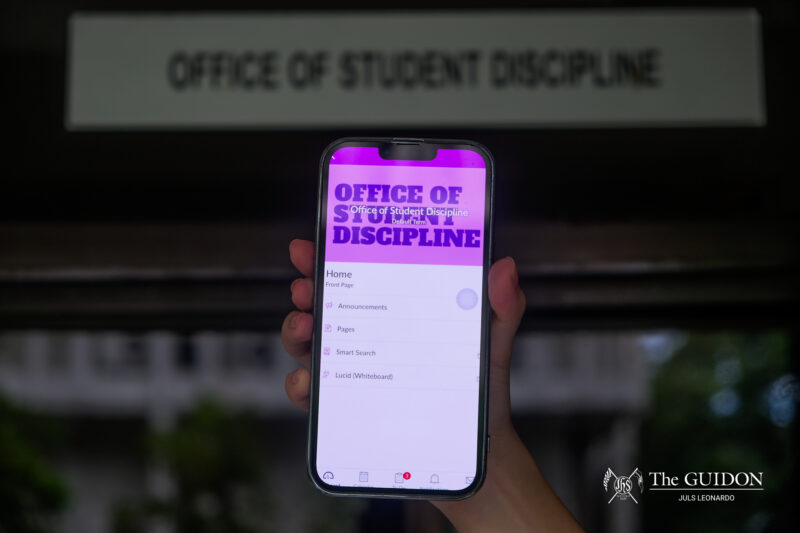A FORUM hosted by Ateneo Assembly on November 3 at the Leong Hall emphasized the role of citizen political engagement in asserting the rights of the different sectors.
Face the Nation 2016, the flagship project of Ateneo Assembly, intended to provide an analysis about the first 100 days of the Duterte administration through a series of lectures on the pertinent issues of the various sectors.
Varying sentiments
Philippine Airlines Employees’ Association President Gerry Rivera shed light on the issue of contractualization and how it had become an “oppressive business model scheme” in the labor sector.
Rivera mentioned how the issue, despite being one of the major topics tackled in the presidential campaigns, is overlooked by the new administration.
He claimed that the changes were barely visible despite the progress made by the Department of Labor on the significant increase in the regularization of workers.
“Until now, more than 100 days later upon [President Duterte’s] assumption into office, wala naman kaming nararamdaman na pagbabago (we haven’t felt any changes),” he said. “Pagbabago in a sense na wala talagang nagre-regulate ng mga contractuals (Change in a sense that there are still no regulation of contractual workers.”
On the other hand, Gillian Dunuan, the National Commission for Indigenous Peoples (NCIP) Officer-in-Charge (OIC) of the Ancestral Domains Office, stressed the need to further uphold the Indigenous Peoples Rights Act (IPRA) at all times.
She mentioned that there are also problems being experienced by the NCIP, such as lack of funding for projects and overlapping jurisdiction with other agencies.
Meanwhile, Commission on Human Rights (CHR) OIC for Public Affairs and Strategic Communications Jacqueline De Guia said that is imperative to understand human rights as a “state obligation” in order to grasp the value of human rights in today’s context.
De Guia explained that the government functions as the primary agency that protects human rights whereas CHR only serves a “monitoring mechanism.”
“It [CHR] is a watchdog, a monitor of whether or not the government, in its executive agencies, [is] doing its job in promoting human rights,” she said.
She also expressed sentiments regarding the administration’s anti-drug and criminality campaign and the rampancy of extrajudicial killings (EJKs) in the country today.
“The commission does agree and support the government in its drug campaign, as well as its anti-criminality campaign,” she said. “If we are to eradicate drugs and criminality, people will be able to enjoy their rights more.”
However, she said that what is disagreeable is the result of the process in executing the campaign. “We do not agree that due process should be dispensed with,” she said.
She said that the CHR had already established an EJK task force, but were challenged by the task of effectively “document[ing] and investigat[ing] their cases.”
“We want to make their stories known to people, to lessen apathy and indifference,” she said. “The essence of our work is for the ‘upliftment’ of our fellowmen.”
Searching for solutions
Aligned with the theme of the forum, the speakers also shared their insights on how the Duterte administration ought to resolve the pertinent issues of society.
To put a stop on contractual labor, Rivera says that investigations should be conducted on companies that employ such practices.
“Kung walang endo, walang pagbabago (If there is no end of contract, there will be no changes),” he says.
Rivera also called upon the government to devote an equal amount of effort in combatting contractualization as they do in the war on drugs.
“Sana yung enerhiya nila na inuubos dun sa drug war ay ganito rin kasidhi yung kanilang kagustuhan na mapatigil na nang tuluyan itong masyadong oppressive na scheme ng contractualization (I hope that their endeavor to abolish this oppressive scheme of contractualization would be as assiduous as their endeavor in the drug war),” he said.
He also encouraged the youth to take little steps in ending contractualization, for they are also heading towards the direction of labor force.
“Tulungan nyo kami dito sa laban na ito, kasi doon din kayo pupunta (May you help us in this battle, for you will also be heading the same direction),” he said.
Despite skeptical of the slow progress of the government, Rivera hoped that concrete actions and real changes would unravel as the administration campaigns against contractualization.
On the other hand, Dunuan explained that bottlenecks in land administration system among the IPs should be addressed through proper cooperation of the various agencies.
Dunuan also stressed the critical role of IPs in the peace process and the huge impact of their participation. She said that coordinating with the National Economic and Development Authority would accelerate the master development plan for the IPs.
To educate the citizens on the importance of human rights, De Guia says that establishing long-term research programs would not only remove negative perceptions about CHR but straighten public misconceptions about human rights.
She adds that these initiatives would be realized through the collaboration of the different sectors, security agencies, and local government units. She also encourages the participation of civil society and youth in spearheading projects that celebrate and promote human rights.
“It is important that our students are kept abreast of recent events and pressing issues about our society in order that we can take a stand and eventually as emerging leaders of tomorrow, we can make a difference,” De Guia said.







